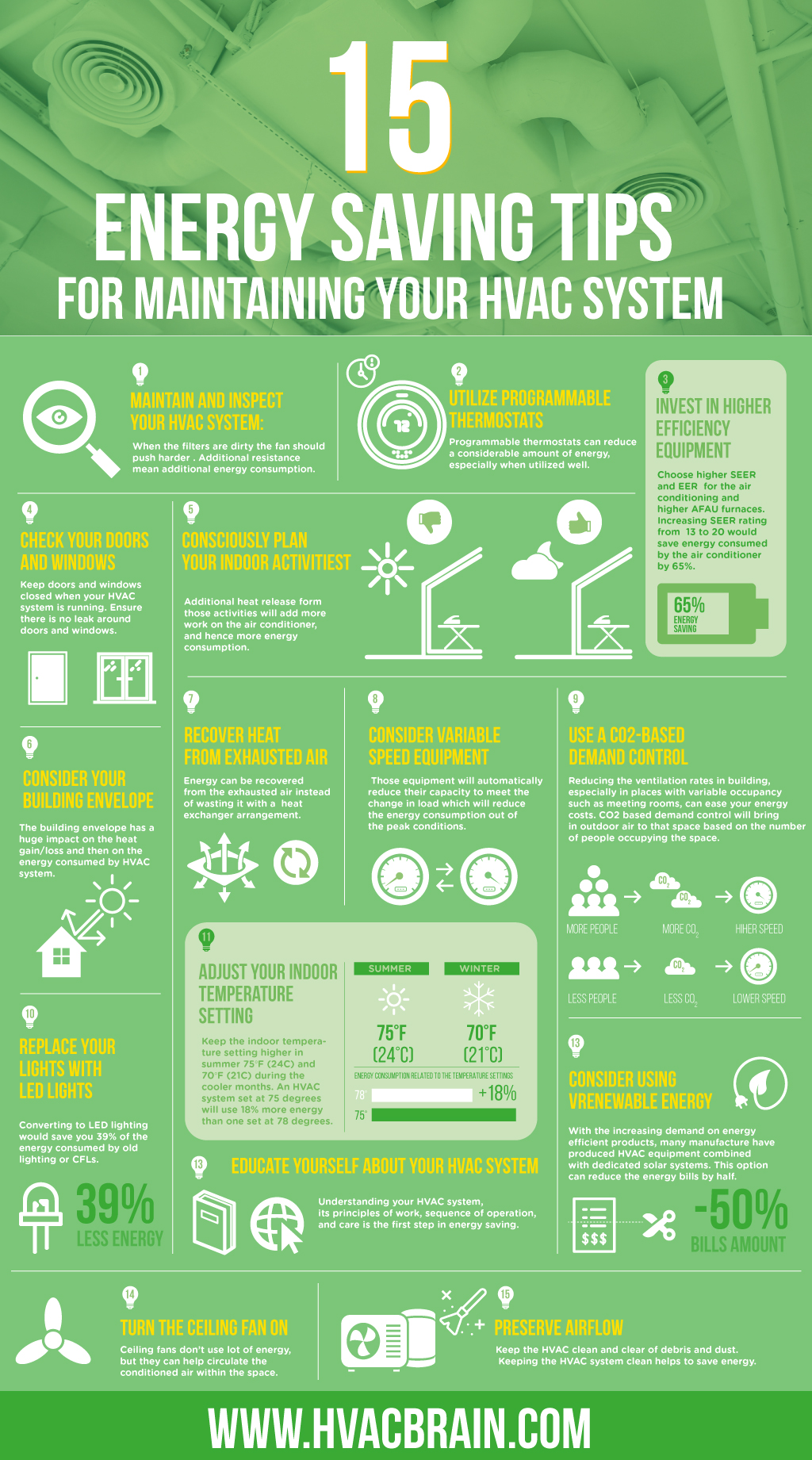 Your energy bills are high and you're wondering why. Looking for energy saving options? Do you think most of your energy bill comes from
HVAC (heating, ventilation and air conditioning) system. Then you are on the right track. Studies show at least 50% of home’s energy consumption comes from HVAC system, and 18% comes from water heating.
Your energy bills are high and you're wondering why. Looking for energy saving options? Do you think most of your energy bill comes from
HVAC (heating, ventilation and air conditioning) system. Then you are on the right track. Studies show at least 50% of home’s energy consumption comes from HVAC system, and 18% comes from water heating.
I'm sure you've heard the saying, “the cheapest kilowatt-hour is the one you don’t use.” Well it tells the whole story about energy saving: to reduce the consumption and then to look if there is available and cheaper source of energy.
Here we are introducing 15 ways to save energy and then reduce your bills.
Want to share this infographic on your site? Just copy the code below!

1. Maintain and Inspect your HVAC System:
Clean air conditioning filters and change furnace’s filter once a month. The fan can be thought of as an air pump, it pushes it to the conditioned/heated space. When the filters are dirty the fan should push harder in order to deliver the amount of air required to keep the space at the desired conditions. The additional resistance mean additional energy consumption.
Also visually inspect the duct, check if there is any leak. Leaking increases energy consumption and should be fixed if found.
2. Utilize Programmable Thermostats:
Programmable thermostats can reduce a considerable amount of energy, especially when utilized well. A programmable thermostat is most useful at times when the HVAC system is running where at less capacity. Most people forget to adjust their thermostat before leaving their home or workplace. A programmable thermostat is an affordable tool to plan your schedule and to have a peace of mind. For example, during the heating season, you leave home at 7:30 a.m. and come back home at 5:30 p.m. It’s waste of energy if you keep the home at the same temperature while you are away, and would save energy if you keep the home at a lower temperature like 60-65֯F (16-18C) till 4:30 p.m. and to have the system run for the last one hour while you are away at a higher temperature, so once you get home it is nice and warm.
3. Invest in Higher Efficiency Equipment:
If you are planning to replace the existing HVAC system or are selecting HVAC equipment for a new building, consider more efficient HVAC equipment. Choose higher SEER and EER for the air conditioning and higher AFAU furnaces. Increasing SEER rating from 13 to 20 would save energy consumed by the air conditioner by 65%.
4. Consciously Plan your Indoor Activities:
During summer, if air conditioning is running, plan your hot work activities (washing, drying, and cooking) in cooler mornings or evenings. This additional heat release form those activities will add more work on the air conditioner, and hence more energy consumption.
5. Check your Doors and Windows:
Keep doors and windows closed when your HVAC system is running. Ensure there is no leak around doors and windows. Sealed home is great way to save energy. If there a leak, install weather stripping around doors and windows. If you are building a new home or renovating an existing one, consider using higher R-value for outside doors and windows.
6. Consider your Building Envelope:
The building envelope has a huge impact on the heat gain/loss and then on the energy consumed by HVAC system. If you are building a new home or are renovating an existing one, consider the insulation of the building, the higher the R-value of insulation the better. Consult an architect or energy specialist to weigh the cost of insulation and energy saving.
7. Recover Heat from Exhausted Air:
The exhausted air from building is at near temperature to the space temperature. Energy can be recovered from the exhausted air instead of wasting it with a heat exchanger arrangement. Refer to our article HRV VS ERV for more information about the function and working principle.
8. Consider Variable Speed Equipment:
If you are planning to replace an existing HVAC system or are selecting HVAC equipment for a new building, consider selecting variable speed fans, motors and compressors. Those equipment will automatically reduce their capacity to meet the change in load which will reduce the energy consumption out of the peak conditions.
9. Use a CO2-Based Demand Control:
Ventilation could be very energy consuming, as you are bringing outdoor air in to condition/heat a space's temperature. Reducing the ventilation rates in building, especially in places with variable occupancy such as meeting rooms, can ease your energy costs. CO2 based demand control will bring in outdoor air to that space based on the number of people occupying the space.
10. Adjust your Indoor Temperature Setting:
Most people will not sense a degree of temperature change. Keep the indoor temperature setting higher in summer 75֯F (24C) and 70֯F (21C) during the cooler months. An HVAC system set at 75 degrees will use 18% more energy than one set at 78 degrees.
11. Replace your Lights with LED Lights:
Replacing old lights and CFLs by LED lights would save energy. A 12.5 Watt LED light will give almost the same efficiency as 20 Watt LED. Converting to LED lighting would save you 39% of the energy consumed by old lighting or CFLs.
12. Turn the Ceiling Fan On:
Ceiling fans don’t use lot of energy, but they can help circulate the conditioned air within the space. If the space temperature is set at higher temperature during cooling, ceiling fans will enhance the comfortable feeling while keeping the energy consumed less.
13. Consider Using Renewable Energy:
With the increasing demand on energy efficient products, many manufacture have produced HVAC equipment combined with dedicated solar systems. This option can reduce the energy bills by half.
14. Preserve Airflow:
Keep the HVAC clean and clear of debris and dust. Keeping the HVAC system clean helps to save energy. Ensure all air outlets are not covered by furniture. Periodically check all vents and duct are not blocked.
15. Educate yourself about your HVAC System:
Understanding your HVAC system, its principles of work, sequence of operation, and care is the first step in energy saving.
While this list is a great start, there are still more ways you can consciously make an effort to decrease your energy consumption. What are more ways you can think of to save energy?

